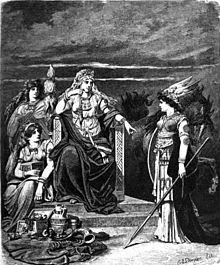Our website is made possible by displaying online advertisements to our visitors.
Please consider supporting us by disabling your ad blocker.
Frigg

Frigg (/frɪɡ/; Old Norse: [ˈfriɡː])[1] is a goddess, one of the Æsir, in Germanic mythology. In Norse mythology, the source of most surviving information about her, she is associated with marriage, prophecy, clairvoyance and motherhood, and dwells in the wetland halls of Fensalir. In wider Germanic mythology, she is known in Old High German as Frīja, in Langobardic as Frēa, in Old English as Frīg, in Old Frisian as Frīa, and in Old Saxon as Frī, all ultimately stemming from the Proto-Germanic theonym *Frijjō. Nearly all sources portray her as the wife of the god Odin.
In Old High German and Old Norse sources, she is specifically connected with Fulla, but she is also associated with the goddesses Lofn, Hlín, Gná, and ambiguously with the Earth, otherwise personified as an apparently separate entity Jörð (Old Norse: 'Earth'). The children of Frigg and Odin include the gleaming god Baldr.
The English weekday name Friday (ultimately meaning 'Frigg's Day') bears her name. After Christianization, the mention of Frigg continued to occur in Scandinavian folklore. During modern times, Frigg has appeared in popular culture, has been the subject of art and receives veneration in Germanic Neopaganism.
- ^ "Frigg" Archived 30 April 2018 at the Wayback Machine. Random House Webster's Unabridged Dictionary.
Previous Page Next Page


